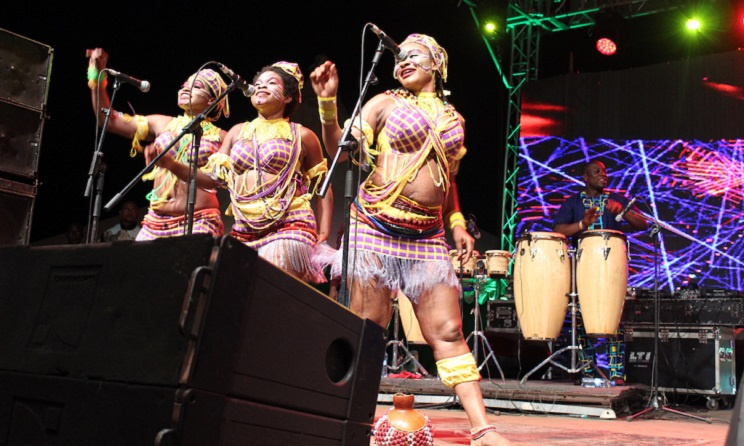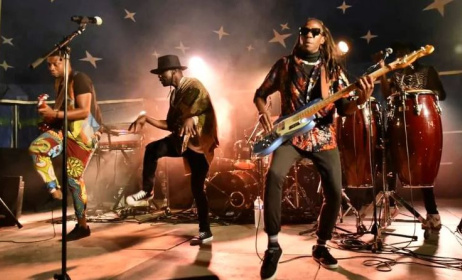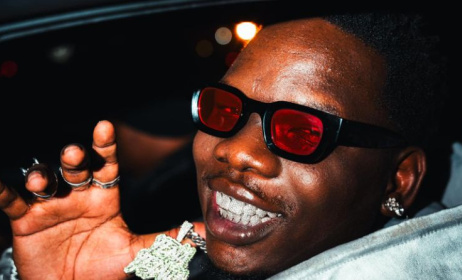Femi Kuti: My children are my first priority
During an up-tempo song towards the end of Femi Kuti's second set at Koroga Festival on 7 July, the musician picked up a water bottle, left the stage and drifted behind one of the enormous speakers situated at the entrance of the stage. Meanwhile, his Positive Force band continued to play as his three traditionally dressed backing singers gyrated to the beat and sung a joyous chorus.
 Afrobeat king Femi Kuti on the Koroga Festival stage. Photos: Capital FM
Afrobeat king Femi Kuti on the Koroga Festival stage. Photos: Capital FM Made Kuti.
Made Kuti. The Positive Force's backing singers brought pomp and colour to the show.
The Positive Force's backing singers brought pomp and colour to the show.
At this point, the late Cape Verdean musician Cesaria Evora came to mind. She was well known for occasionally leaving the stage to have a smoke and a glass of wine while her band continued to play soft instrumentals.
Femi took a few sips of water, enough to lubricate his vocal cords, and in about a minute swiftly returned to his microphone and keyboard. Next to him on a stand was his saxophone, which he would occasionally spill over and play. On the keyboard stand was a white towel, which he put to use each time sweat trickled down his face.
This performance was not Femi's first in Nairobi. His first was in June 2005 alongside his eldest son, Made Anikulapo Kuti, who was about eight years old at the time.
This time around, Femi stepped onto the stage to a large, cheering crowd, thundering congas and the powerful blast of the horn section. A group of young men and women had gathered at the front, shouting "Femi! Femi!" Perhaps this is what triggered the musician into setting the record straight: "My music is Afrobeat and not Afrobeats." The crowd cheered. "Each song must sound different and unique,” he concluded.
Afrobeats is the name given to Nigeria's pop music – much to the chagrin of the Afrobeat classicists – and is quite prevalent in Kenya. Young people here are quite familiar with Wizkid, Davido and Tiwa Savage, who occasionally stage concerts in the country. However, for most, Femi's performance was their first live contact with Afrobeat.
His setlist was made up of old and recent tunes. With every song he set the stage for pan-African socio-political commentary, speaking eloquently against corrupt leadership and about the need for peace and love, especially in Sudan, Somalia and the DRC. At this point, he was maintaining the primary core of his music: wisdom and philosophy.
Just like his father, the late Fela Kuti, who still remains a cultural icon and revered iconoclast, Femi is a master of pairing pain, sadness and anger with warm-blooded party music.
But as much as the father and son have a lot in common, their impulses and parental skills differed. In an interview with Music In Africa, Femi said that his father's place in society forced him to prioritise his career over his family and children.
"One must understand that my father was a superstar and everybody wanted a piece of him, and his immediate family suffered," he said. "Now, as a father, it was gradually going to happen with me, and I was like, 'Hey, this is the same story all over again.' So I had to stop. I needed my children to know that they will always come first in their home, and their home is me, their father."
Femi, who has enjoyed a successful career for more than four decades, turns 58 next year, which was Fela's age when he died in1997.
"My children are my first priority, and as a father, I want to make sure that before I leave this life I give them balance. If I can achieve that then I think I can say that I have lived a fulfilled life," Femi said.
"My father would have been amazed of what I was doing were he alive today. He would be very proud of what I have archived with my son and would probably be apologising that he should have done more for me."
So far, Femi has successfully mentored his son Made, an accomplished musician and multi-instrumentalist in his own right. Made officially joined the Positive Force in December last year after graduating from London's Trinity Laban Conservatoire of Music and Dance. He has been touring with his dad since.
And Koroga Festival provided the perfect opportunity for Femi to introduce the young Kuti to the Kenyan audience. "That is my son Made on the bass. Very handsome but a coolheaded guy," he said as the crowd broke into loud applause. Made later joined his father on sax, the two men conversing with their instruments. Made also showed off his circular breathing chops by playing a single note for about three minutes. This sent the crowd into a frenzy.
Soon after, the band dropped the 'Beng Beng Beng' beat, and the crowd lost control. It was the perfect climax for a show that will be etched in the minds of Kenyan music fans for many years to come.



































Comments
Log in or register to post comments